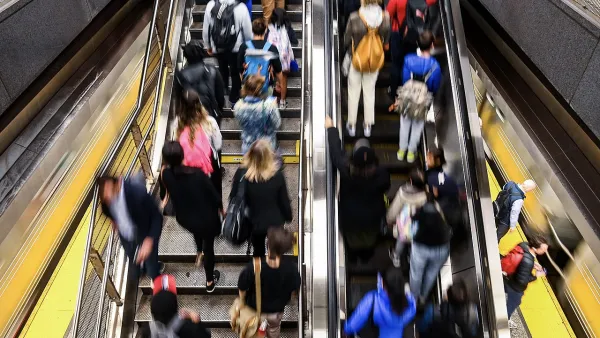In a survey, riders expressed concern about safety, cleanliness, and timeliness on the region’s buses and trains.

Women are using Los Angeles Metro’s buses and trains less than before the pandemic, according to the Los Angeles Metropolitan Transportation Authority (L.A. Metro). Writing for the Los Angeles Times, Grace Toohey explains that the agency says it is close to getting back to regular schedules but still faces an operator shortage, leading to unreliable service and long headways.
In a survey administered by Metro to over 12,000 transit riders, riders cited safety as a top concern, with other concerns including cleanliness and reliability. “Elizabeth Medrano, a bus rider since the 1990s and now a transit organizer with the nonprofit Women Organizing Resources, Knowledge and Services, said it’s hard to pinpoint one reason for decreased female ridership, but noted the pandemic is still affecting many women, who are struggling financially as they are unable to return to the jobs they held before the pandemic.”
Jennifer Vides, Metro’s chief customer experience officer, says the agency is working to address rider complaints. “We are looking at all of it, we are convening teams to talk about the results from the survey and to develop a customer experience plan that addresses these things,” Vides told the L.A. Times. “. Metro officials and community leaders are also hopeful that the new transit ambassador pilot program — which is putting 300 uniformed and trained, yet unarmed, Metro staff on trains and buses — will improve safety by increasing the number of people at transit hubs and providing support to anyone who needs help.”
FULL STORY: Women's ridership is down on L.A. Metro, new survey shows

Planetizen Federal Action Tracker
A weekly monitor of how Trump’s orders and actions are impacting planners and planning in America.

Chicago’s Ghost Rails
Just beneath the surface of the modern city lie the remnants of its expansive early 20th-century streetcar system.

Amtrak Cutting Jobs, Funding to High-Speed Rail
The agency plans to cut 10 percent of its workforce and has confirmed it will not fund new high-speed rail projects.

Ohio Forces Data Centers to Prepay for Power
Utilities are calling on states to hold data center operators responsible for new energy demands to prevent leaving consumers on the hook for their bills.

MARTA CEO Steps Down Amid Citizenship Concerns
MARTA’s board announced Thursday that its chief, who is from Canada, is resigning due to questions about his immigration status.

Silicon Valley ‘Bike Superhighway’ Awarded $14M State Grant
A Caltrans grant brings the 10-mile Central Bikeway project connecting Santa Clara and East San Jose closer to fruition.
Urban Design for Planners 1: Software Tools
This six-course series explores essential urban design concepts using open source software and equips planners with the tools they need to participate fully in the urban design process.
Planning for Universal Design
Learn the tools for implementing Universal Design in planning regulations.
Caltrans
City of Fort Worth
Mpact (founded as Rail~Volution)
City of Camden Redevelopment Agency
City of Astoria
City of Portland
City of Laramie





























